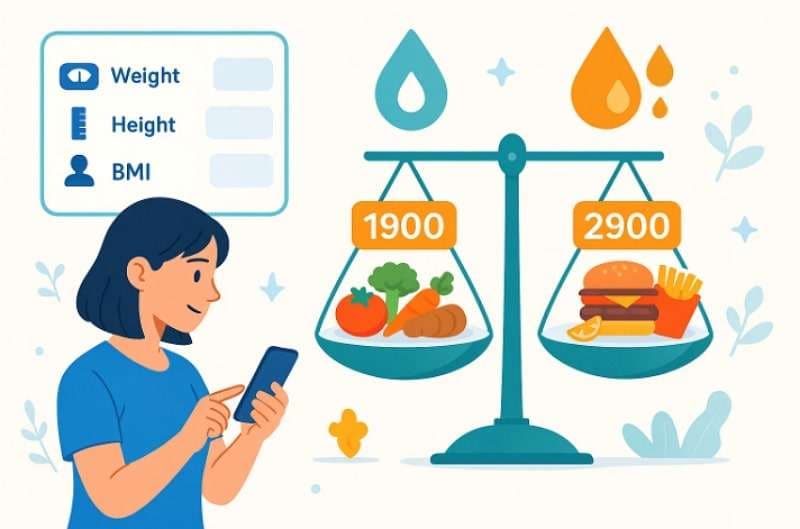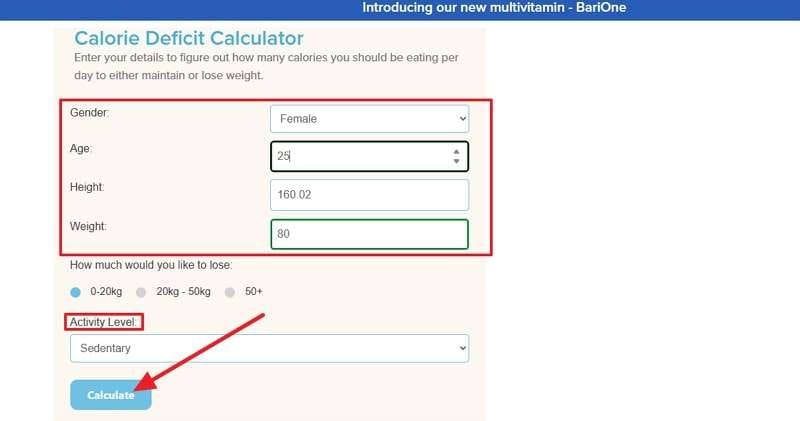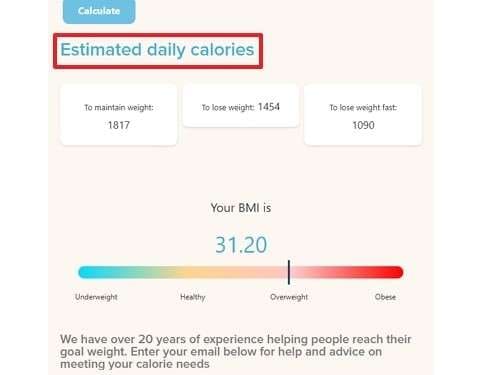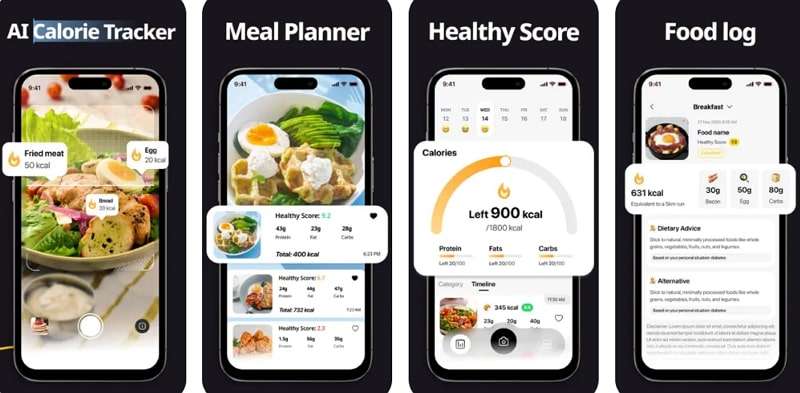Many people attempt to lose weight by restricting their food intake, but often see little to no change. What matters is the lack of understanding of how to achieve a calorie deficit for weight loss and maintain consistent fat loss. When eating less, one becomes weak, but overeating will delay results. The answer is to seek a moderate caloric deficit, which will help in burning fat without interfering with health.
This would include knowing how your body utilizes energy and keeping a proper check on what you eat. Hence, this article will guide you on the amount of calorie deficit needed as well as the lifestyle tips that will enable you to stick to the plan easily. The result will be an understanding and ability to achieve your weight loss goals.
In this article
Part 1. How Much Calorie Deficit Is Needed to Lose Weight?
Regarding calorie deficit and weight loss, you need several personal factors, such as your BMI, weight, and height. The number depends on the individual since each person burns energy differently. To take an example, you are 80 kg (176 lbs), and your TDEE is approximately 2400 calories, then a daily deficit of 500 calories would be 1900 calories. This resulted in approximately 0.5 kg (1 pound) of weight loss of fat per week.

If you wanted to gain weight, you would have to eat approximately 2900 calories a day, 500 extra calories above the TDEE. To get your own ideal calorie goal, follow an advanced calorie calculator such as the Healthier Weight Calorie Deficit Calculator. These tools do the math for you, helping you set realistic calorie goals for fat loss, and here is how you can get your personal BMI:
Step 1. Access the tool from the browser and add the required information, such as "Gender" and "Weight," then select the "How Much You Want to Lose" option. Next, press the "Calculate" button at the bottom and proceed.

Step 2. Here you'll get the calorie information under the "Estimated Daily Calories" section, whether you want to lose or maintain weight.

Part 2. Count Your Daily Calorie Intake Through Advanced Tools - CalBye App
With your kcal deficit for weight loss determined, it's essential to adhere to your diet by monitoring your intake. Therefore, use CalBye to organize meals with the built-in calendar, helping you stay on track with your calorie deficit or diet plan. Rather than typing all of the ingredients, you need to take a photo of your food, and the AI-based system will compute the calories.

It gives you an option to save your most common meals to your favorites list so you can add them to your daily log without re-entering them every time. Moreover, CalBye cares about user privacy, so your data is not collected and shared with third parties, and all your data is encrypted during its use. The number of calories, carbs, fats, and other aspects can also be checked separately.
Key Features
- Innovative Meal Suggestions: CalBye will recommend alternative meal suggestions that better fit your calorie deficit or health goals if the food you post doesn't meet your needs.
- Custom Calorie Targets: This AI food tracker can compute an exact calorie goal, using your age and other variables.
- Healthy Score: It gives you an immediate "Healthy Score" of each meal so you can quickly understand how well it fits your nutrition and weight loss objectives.
Why Choose This AI Food Tracker
- When you record meals visually, you will automatically become more aware of the portion and will not overeat.
- Knowing how many calories you are taking and the balance between nutrients in real time keeps you motivated to keep going.
- Analysis of AI-based ingredients allows for the discovery of hidden high-calorie ingredients to make more intelligent substitutions.
- Extensive documentation will make you understand how to eat and not overeat as you become more aware of the portion sizes by logging the meals visually.
- Being monitored constantly will help you to form healthier eating habits that will not stop once you have reached your goal.

Part 3. How to Achieve Calorie Deficit and Weight Loss Goals
Having learned to determine your ideal calorie deficit for fat loss, the following step is to implement effective diet and exercise techniques. The next segment details essential strategies in nutrition and exercise to assist you in sustaining a deficit while protecting muscle and maximizing fat loss:
1. Diet: Structuring for Caloric Efficiency
The first step is to estimate Basal Metabolic Rate (BMR) with the help of the Mifflin-St. Jeor's formula takes into account your age and other factors. Then, you will be able to calculate TDEE by multiplying BMR by your activity level. To create a calorie deficit, cut your TDEE by 500 to 750 calories. Ensure that you take sufficient protein (1.6-2.2g/kg body weight) to maintain muscle during dieting.
Carbohydrates can be adjusted depending on your exercise requirements, but tend to range between 3-6g per kg. Consume fats of at least 20 percent of your total calories to stay healthy with hormones. Record what you eat more precisely via digital scales and applications based on genuine nutrition facts. Fill your diet with lean meat, legumes, and high-fiber vegetables to keep yourself on track and full.

2. Exercise: Maximizing Energy Expenditure and Fat Utilization
Resistance train 2-3 times per week to increase calorie deficit, without losing muscle. Focus on big muscle groups by using a compound workout activity. To increase the number of calories burned, incorporate moderate-intensity aerobic activity (50 to 75 percent of maximum heart rate) like brisk walking and/or bicycling, 150 to 300 minutes a week. Make sure the training intensity and the volume vary in design to avoid plateaus and overtraining.
Track progress via metrics like VO2max & Lean Mass Index via DEXA scan or bioelectrical impedance, while maintaining muscle mass and achieving the calorie deficit needed to lose weight. Moreover, high-intensity interval training (HIIT) burns calories more efficiently in less time, thanks to post-exercise oxygen consumption, but it would be wise for beginners to introduce it gradually.

Part 4. Other Things to Consider for Calorie Deficit and Weight Loss
The achievement of calorie deficit and weight loss is not only about reducing calories and getting exercise. Knowing more not only about the overall benefits of activity but also about other factors that you may consider can help with the overall results and sustainability.
- Boost NEAT: NEAT covers every calorie you burn that is not formal exercise, such as walking or other chores. An enhancement of NEAT will vastly increase the expenditure of calories daily without having to engage in well-organized workouts.
- Prioritize Sleep: Lack of sleep interferes with the hormones working to control hunger and satiety, leaving the person often with a craving and an appetite. Moreover, sleeping well for 7 to 9 hours helps in fat loss because it enhances metabolic activity and energy levels.
- Drink Water: Being hydrated will promote the perfect metabolic rate and aid in digestion. Thirst may also be confused with hunger, and thus, consuming a vast amount of water may help avoid consuming unnecessary calories.
- Meet Micronutrient Needs: On a calorie diet, being able to meet vitamin and mineral requirements is essential for energy, immune, and general health. Insufficiencies may hamper fat burning and make you fatigued or even cause you to lose muscle.
- Managing Stress for Hormonal Balance: Stress also increases the level of cortisol, which stimulates fat in the abdomen, especially. By adding relaxation procedures, one can cope with the feeling of stress and manage a calorie deficit, along with successful weight loss.

Conclusion
It's important to remember that although a calorie-deficient and weight-loss diet should be followed to lose weight, effectiveness will be ensured by the maintenance of lifestyle choices. Drinking liquid and focusing on nutrient-rich food not only simplifies the process but also improves overall health.
Furthermore, combining such routines with a planned diet and the assistance of clever tools such as CalBye to keep track of calories should ensure that you do not regress.

FAQs
-
Is it possible that a calorie deficit has effects on my metabolism in the long term?
Yes, keeping yourself in a large calorie deficit over prolonged periods may slow your metabolism down as the body adjusts to spend fewer calories. It is due to this that gradual adjustments will be more sustainable in the long-term outcomes. -
Does muscle gain occur in a calorie deficit?
Yes, muscle and fat loss are possible depending on an adequate strength-training regimen and adequate protein. Nevertheless, the progress will be slower in comparison to eating at a surplus. -
How can I avoid nutrient deficiency when in a calorie deficit?
To avoid such a deficiency, emphasis must be on nutritious whole foods that contain vegetables, healthy fats, and lean protein foods. Since reduced calories will cause fat reduction, a moderate strategy will make sure that this process does not disrupt the necessary vitamins and minerals. -
Does good sleep affect weight loss outcomes?
Yes, lack of sleep may disturb hunger hormones, make you crave more, and lead to inefficiency in calorie burning. Good sleep will help maintain a higher compliance rate with your calorie intake.






